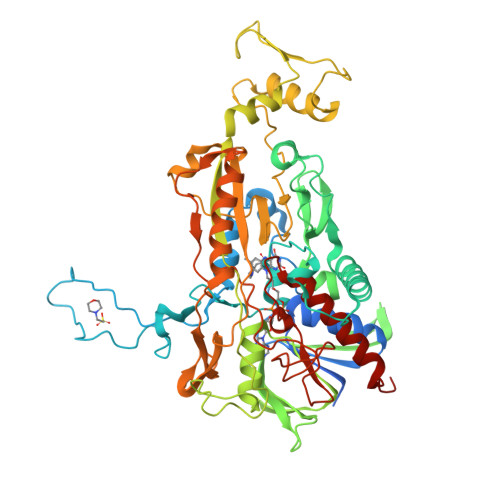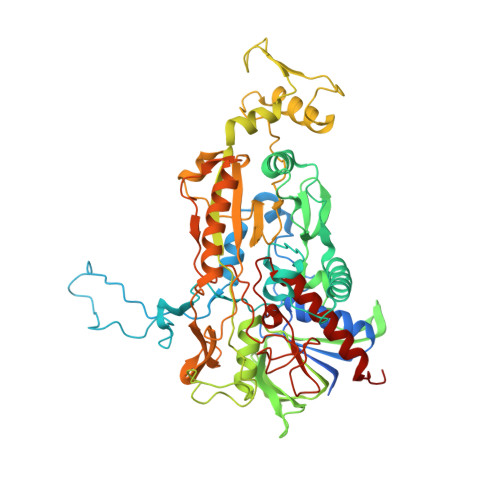Improving thermostability and catalytic activity of pyranose 2-oxidase from Trametes multicolor by rational and semi-rational design
Spadiut, O., Leitner, C., Salaheddin, C., Varga, B., Vertessy, B.G., Tan, T.C., Divne, C., Haltrich, D.(2009) FEBS J 276: 776-792
- PubMed: 19143837
- DOI: https://doi.org/10.1111/j.1742-4658.2008.06823.x
- Primary Citation of Related Structures:
3BG6, 3BG7, 3BLY - PubMed Abstract:
The fungal homotetrameric flavoprotein pyranose 2-oxidase (P2Ox; EC 1.1.3.10) catalyses the oxidation of various sugars at position C2, while, concomitantly, electrons are transferred to oxygen as well as to alternative electron acceptors (e.g. oxidized ferrocenes). These properties make P2Ox an interesting enzyme for various biotechnological applications. Random mutagenesis has previously been used to identify variant E542K, which shows increased thermostability. In the present study, we selected position Leu537 for saturation mutagenesis, and identified variants L537G and L537W, which are characterized by a higher stability and improved catalytic properties. We report detailed studies on both thermodynamic and kinetic stability, as well as the kinetic properties of the mutational variants E542K, E542R, L537G and L537W, and the respective double mutants (L537G/E542K, L537G/E542R, L537W/E542K and L537W/E542R). The selected substitutions at positions Leu537 and Glu542 increase the melting temperature by approximately 10 and 14 degrees C, respectively, relative to the wild-type enzyme. Although both wild-type and single mutants showed first-order inactivation kinetics, thermal unfolding and inactivation was more complex for the double mutants, showing two distinct phases, as revealed by microcalorimetry and CD spectroscopy. Structural information on the variants does not provide a definitive answer with respect to the stabilizing effects or the alteration of the unfolding process. Distinct differences, however, are observed for the P2Ox Leu537 variants at the interfaces between the subunits, which results in tighter association.
Organizational Affiliation:
Department of Food Sciences and Technology, BOKU-University of Natural Resources and Applied Life Sciences, Vienna, Austria.




















